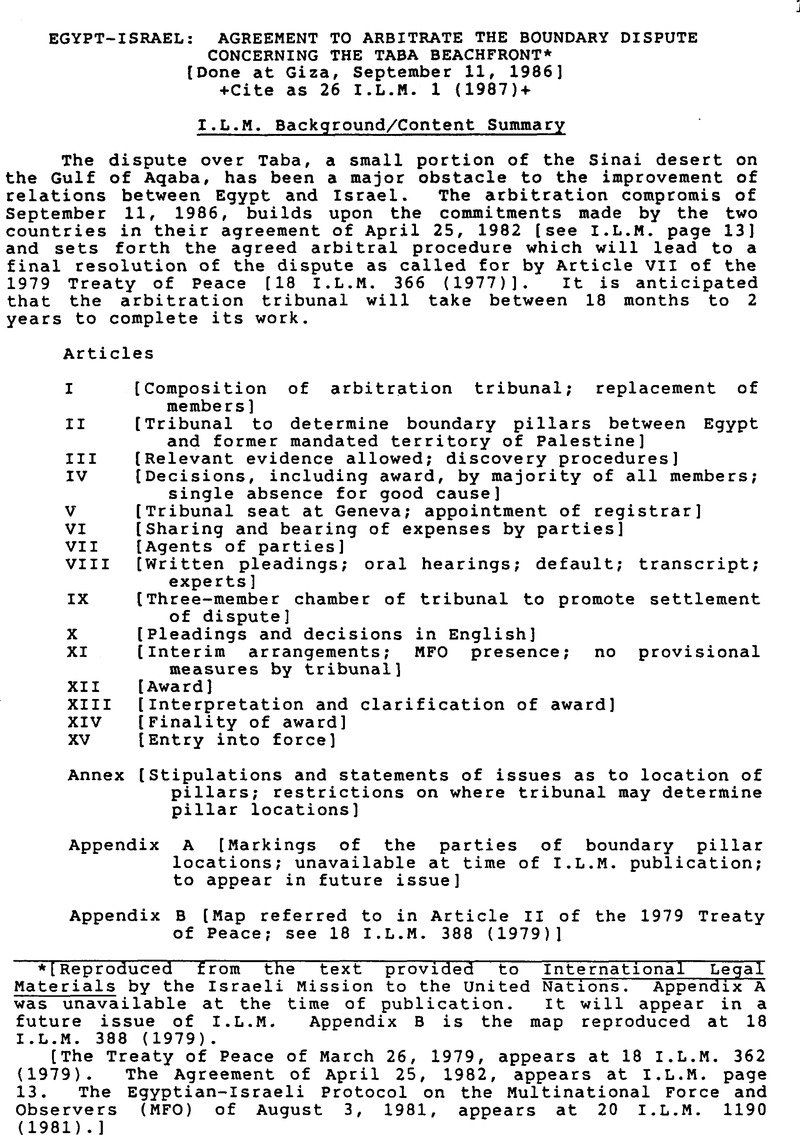No CrossRef data available.
Published online by Cambridge University Press: 27 February 2017

Reproduced from the text provided to International Legal Materials by the Israeli Mission to the United Nations. Appendix A was unavailable at the time of publication. It will appear in a future issue of I.L.M. Appendix B is the map reproduced at 18 I.L.M. 388 (1979).
* [See I.L.M. page 256.J Press release 223 of Oct. 16]
* Text from Weekly Compilation of Presidential Documents of Oct 20.
* Made in a meeting with executive branch officers of the Department of State and the U.S.Arms Control and Disarmament Agene,(text from Weekly Compilation of Presiuen tial Documents of Oct. 20).
* [See footnote at page 225.]
1 Sec.1103. Public Law !)8r,25, approved Oct. 19, 1984.
1 Sec.33, Arms Control and Disarmament Act (Public Law 87-297), approved Sept. 26, 1961.
2 Vance,Cyrus Hard Choices.New York,Simon and Schuster,1983, 51.
3 Public Law 92-448, approved Sept. 30, 1972.
4 Talbott, Strobe. Endgame. NewYork, Harper Row, 1982, p.31. ‘
5 Heginbotham|Stanley J.Constraining Salt II: The Role of the Senate. Congress and United States Foreign Policy: The Javits Years, 1946-1980. State University of New York, Stony Brook, Oct. 25, 1985.
6 Talbott, Strobe. Endgame, p. 95.Signed during ford administrate Oiler adminstialion niled to submit with PeactM Nuclear Eiptoaom Treaty. Although nut force, US and USSR Worma agreed not to lest over ISO Motoni.
1 Although not in force, President Reagan on May 30. 1982. declared that the United States mold continue 10 refrain Iron action tint mild undercut eiislmg Salt agreements as long as the Soviet Union showed equal lestrainl. Senate Foreign Retalions Committee reported S.J. Res.212 July 12, 1912, supporting this policy: nol voted on by Senate. Sec. 1001 of Department of Defense Authoraation Act of 1916 (PL 99-US) spresed supportTra undercut policy through Ihe end of 1986.
2 Frye, Alton. A Responsible Congress: the Politics of National Security. New York,McGraw Hill, 1975, p. 28.
3 Platt, Alan. The U.S. Senate and Strategic Arms Policy, 1969-1977. Boulder, Westview, 1978, p. 14. ‘ Platt, The U.S. Senate and Strategic Arms Policy, p. 18.
4 The provision, passed by the Senate, was deleted in conference on the authorizations bill, but restored in the appropriation act. Department of Defense Appropriation Act, 1977. Public IJIW (14-419, approved Sept. 22, 1976.
5 Department of Defense Appropriation Act, Public Law 95-111. See U.S. Congress. House. Committee on Foreign Affairs. Congress and Foreign Policy 1977, p. 63.
6 For fuller discussion see Gray, Robert. Congress, Arms Control, and Weapons Modernization. In U.S. Congress. House. Committee on Foreign Affairs. Congress and Foreign Policy, 1983, pp. 86-109.
7 Gray, Robert. Congress, MX, and Arms Control. In Congress and Foreign Policy, 1984, p. 66.
8 Public Law 99-17 and Public Law 99-18, approved Apr. 1,1985.
9 Public Law 99-145, approved Nov. 8, 1985.
10 Public Law 99-190, approved Dec. 19, 1985.
11 Continuing appropriations resolution for fiscal year 1985, Public Law 98-473, approved Oct. 12, 1984.
12 Public Law 99-145, approved Nov. 8, 1985.
13 Congressional Record, Sept, 4,85, p.h.7248.
14 Members were Representatives George K. Brown Jr., Joe Moakley, John F, Seiberling, and Matthew F. McIIugh. New York Times. Sept. 11, 1985, p. A4.
15 New York Times, Sept. 13, 1985, p. A8.
16 Sec. 8097, Defense Appropriations Act, Public Law 99-190, approved Dec. 19, 1985.
17 An Interview with Gorbachev. Time, Sept. 9, 1985. p.22
18 Sec. 221-226, Department of Defense Authorization Act, 1986, Public Law 99-145, approved Nov. 8, 1985, and Defense Appropriation Act, Public Law 99-190, approved Dec. 19, 1985.
1 U.S. Congress. House and Sneate. Committees on Foreign Affairs and Foreign Relations. Re quired Reports to Congress in he Foreign Affairs Field. Joint Committee Print, Apr. 22, 1973. Study now being updated by Ingressional Research Service
2 Berdes, George. Congress1 New Leverage. The Center Magazine, July/August 1976, pp. 76- 80.
3 U.S. Congress. House. Committee on Foreign Affairs. Senate. Committee on Foreign Relations. Fiscal Year 1982 Arms Control Impact Statements. Joint committee print. May 1980. 522 PP-
4 U.S. Congress. House. Committee on Foreign Affairs. Executive gislntive Consultation on Foreign Policy: Strengthening the Legislative Side. Committee Print, April 19H2, p. 53.
5 Sec. 8100, Public Law 98-473 (Continuing Appropriations Resolution) approved Oct. 12, 1984, and Sec. 205, Department of Defense Authorization Act, Public Law 98-525, appoved Oct. 19, 1984.
6 103 S. Ct. 2764 (1983). A legislative veto is a provision permitting Congress to approve or disapprove executive branch actions without full legislative action, for example by a simple or concurrent resolution that is not presented to the President for signature.
7 Gnrfinkle, Adam M The Politics of the Nuclear Freeze. Philadelphia, Foreign Policy Research Institute, 1984, 258 pp.
8 Corwin, Edwnrd S. The President: Office and Powers. New York, New York University Press. 1957, p. 17.
9 Congressional Quarterly, Oct. 5, 1985, p. 1905
10 H.J. Res. 3, adopted 268-148, Feb. 26, 1986.
11 Platt, The U.S. Senate and Strategic Arms Policy, p. 4. Where for the purposes of this Treaty it is necessary to determine the position on the surface of the Earth of a point, line or area, that position shall be determined by reference to the Australian Geodetic Datum, that is to say, by reference to a spheroid having its centre at the centre of the Earth and a major (equatorial) radius of 6 378 160 metres and a flattening of 1/296.25 and by reference to the position of the Johnston Geodetic Station in the Northern Territory of Australia. That station shall be taken to be situated at Latitude 25°56'54.5515”South and at Longitude 133°12'30.0771” East and to have a ground level of 571.2 metres above the spheroid referred to above.